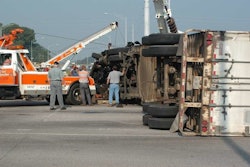
More than 730,000 employees in the trucking industry are included in President Joe Biden’s COVID-19 vaccine and testing mandate, which the Occupational Safety and Health Administration (OSHA) is set to publish in the Federal Register Friday, Nov. 5.
Companies with 100 or more employees will be required to comply with the mandate by no later than Jan. 4, 2022, according to the White House. Multiple trucking agencies had sought an exemption, claiming mandatory vaccine enforcement would place additional pressure on a supply chain that is already under duress, but those calls and warnings went unheeded.
Truckload Carriers' Association President Jim Ward noted that lumping trucking into a blanket labor force mandate was especially troubling given that Secretary of Transportation Pete Buttigieg "has already acknowledged the fact that we're up against a labor challenge for commercial truck drivers, as well as other workers in the industry. It's extremely disappointing."
The mandate requires employers to develop, implement and enforce a COVID vaccination policy or a policy wherein unvaccinated workers undergo regular COVID-19 testing and wear a face covering at work. To comply with the mandate, workers will need to have the necessary shots to be fully vaccinated – either two doses of Pfizer or Moderna, or one dose of Johnson & Johnson – in fewer than 9 weeks from now.
[Related: Attorneys say OTR drivers not subject to vaccine, testing requirement]
For employers who adopt a policy allowing for a testing option in lieu of vaccination, the rule requires employees to be tested at least weekly and wear masks in the workplace. OSHA is also gathering more information about whether it should require more frequent testing than weekly.
Any workers who test positive for COVID will face a mandatory temporary removal from the workplace to prevent transmission of the virus. OSHA acknowledged that regular testing and mask requirements are less protective of unvaccinated workers than simply requiring all workers to be vaccinated, but the agency said it has not had a “full opportunity to assess the potential ramifications of including a strict vaccination mandate in this rule.”
OSHA’s Emergency Temporary Standard (ETS) also requires that employers provide paid time, up to four hours, for employees to get vaccinated.
The determination to include only employers with 100 or more employees, OSHA says, is because it is confident that employers of that size “have the administrative capacity to implement the standard’s requirements promptly." OSHA is less confident that smaller employers can do so "without undue disruption.” OSHA says it needs more time to assess the capacity of smaller employers and asked for public comment to help the agency make that decision.
[Related: Effect of vax mandate on trucking likely to mirror that of a severe weather event]
In addition to the vaccination and testing requirements of the ETS, the rule also requires employers to keep records of each employee’s vaccination status and keep proof of vaccination for each employee who is fully or partially vaccinated.
There are few limited exemptions in the rule for workers who do not report to a workplace where other individuals such as coworkers or customers are present; while working from home; or who work exclusively outdoors. “OSHA intends these provisions to exempt workplace settings where workers do not interact indoors with other individuals, and to exempt work performed in the employee’s home regardless of whether other individuals may be present in the home,” the rule states.
Trucking, however, doesn’t fall under any of those conditions. According to the rulemaking, there are 2,597 employers who fall under the North American Industry Classification System (NAICS) code for “Truck Transportation” that have 100 or more employees and are covered by the mandate. Those companies have a total of 878,429 employees, of which 739,360 are covered by the rule.
American Trucking Associations (ATA) said those exemptions should apply to truck drivers, and a handful of transportation attorneys agree in some respects.
"The rule published [Thursday] should not impact employees who work alone and have minimal contact with others indoors. In our view, that exemption should cover the commercial truck driver population, and we are seeking further guidance from OSHA to clarify and confirm that," the group said in a statement Thursday night.
OSHA said it has determined that many employees who are not fully vaccinated “face a grave danger from exposure” to COVID in the workplace. “This finding of grave danger is based on the severe health consequences associated with exposure to the virus along with evidence demonstrating the transmissibility of the virus in the workplace and the prevalence of infections in employee populations,” OSHA said, adding it focused on workplaces because that's where multiple people come into contact with one another for extended periods of time.
“When employees report to their workplace, they may regularly come into contact with co-workers, the public, delivery people, patients, and any other people who enter the workplace,” the rule states. “Workplace factors that exacerbate the risk of transmission of SARS-CoV-2 include working in indoor settings, working in poorly-ventilated areas, and spending hours in close proximity with others”
Almost none of that criteria, Ward argued, is applicable to a truck driver.
"[Truck drivers] operate in an isolated environment every day of their workday. They have limited interactions at customers and travel centers and those kinds of locations," Ward added. "And so I'm really shocked that we didn't follow our good friends in the north in Canada with exemption. So, yes, it's disappointing."
The Canadian government this summer announced plans to require COVID-19 vaccinations for its transportation sector but did not include the trucking industry.
"The rule published [Thursday] exempts employees who exclusively work outdoors or remotely and have minimal contact with others indoors, and all indications thus far from the Department of Labor suggest this exemption does apply to the commercial truck driver population," ATA President and CEO Chris Spear said via statement Friday. “While we complete our due diligence to confirm that fact through official channels, we see quotes from Labor Secretary Walsh as an enormous victory for our association and industry."
Spear noted that ATA continues to believe OSHA is using "extraordinary authority unwisely, applying it across all industries at an arbitrary threshold of 100 employees that fails to factor in actual risks," adding, "we are weighing all options of recourse to ensure every segment of our industry’s workforce is shielded from the unintended consequences of this misguided mandate.”
Trucking groups weighing options
The employee-count threshold means the mandate will not apply to most owner-operators, but Owner-Operator Independent Drivers Association (OOIDA) Director of Public Relations Norita Taylor said the group is reviewing the text "to determine if the ETS will cover leased-on and/or employee drivers with larger carriers."
Ward, who is also president of Williamsport, Maryland-based carrier D.M. Bowman, expressed his disappointment at the mandate and its lack of exemption for an industry that stood tall in the worst of the pandemic, and an industry that in the throes of the pandemic – before a vaccine was even available – suffered a COVID infection rate of less than 9% versus a national average of more than 13%.
There's no shortage of entities opposing mandatory vaccines. Private sector companies, nonprofit groups and about a dozen states have either already filed preemptive measures or have pledged to file suit against the mandate. Ward said TCA is still analyzing the mandate to determine its next steps and couldn't rule out TCA either joining either joining a lawsuit or filing one of its own. In the meantime, TCA encouraged its membership contact local congressional representatives and explain the ramifications of further gumming up the supply chain.
"President Biden cannot call on trucking to 'work harder' when his policies are cutting us off at the knees and depriving us of the workforce we need," TCA wrote in an email to its membership Thursday, citing that enforcing a vaccine mandate could chase thousands of drivers from an industry that is already 80,000 drivers short. Ward said recent survey data suggests about 50% of commercial truck drivers have not been vaccinated, and 37% said that if mandated to get one, they would consider leaving the industry.
Travis Vance, an attorney with Fisher Phillip – a firm that specializes in workplace safety – said carriers wishing to contest the mandate should get behind a trade group – like TCA, ATA or similar organization planning a suit – versus going solo and being singled out as an anti-vax company.









